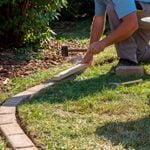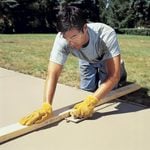The 3 Main Types of In-Ground Pools

You've decided to install an in-ground pool. Now it's time to decide between the three main types of in-ground pools: concrete, acrylic sheet and vinyl.
So you’ve decided to take the plunge and install a swimming pool. Congratulations! Now it’s time to decide which of the three main types of in-ground pools is best for you. Here’s a look at the pros and cons of concrete, fiberglass and vinyl-lined pools.
On This Page
Concrete Pools
Concrete or cement pools are built from a reinforced concrete, wood or steel shell that’s poured or sprayed with cement, which is then plastered and painted.
Pros of concrete pools:
- Extremely durable. Can last for decades with proper pool maintenance;
- Can be resurfaced rather than replaced;
- Can be customized to virtually any shape, size and depth;
- Customizable features include waterfalls, infinity edges, zero entry and attached spas.
Cons of concrete pools:
- Cost. They’re the most expensive type of in-ground pool to install;
- More costly to maintain than other types of pools;
- Installation takes longer than other types of pools, typically eight to 12 weeks;
- Can crack due to soil movement or earthquakes.
Fiberglass Pools
These are pre-formed pool “shells” placed into an excavated hole in your yard. While pool buyers were once limited to a few basic shapes, there is now a much wider variety of fiberglass pool forms.
Pros of fiberglass pools:
- Easiest and fastest to install of all in-ground pools;
- Cheaper to install than a concrete pool;
- Fewer chemicals and maintenance than other types of in-ground pools.
Cons of fiberglass pools:
- Harder to customize. Buyers are usually limited to the existing shapes and designs of available pool shells;
- Must be delivered in one piece, limiting their size;
- Faulty installation can result in major complications and costly repairs;
- Must have enough yard access for a crane to lower the pool shell into place. The area also needs to be free of overhead utility wires.
Vinyl Pools
Vinyl or vinyl-liner pools are made by attaching a heavy-duty vinyl liner to an in-ground frame, which may be made of plastic, steel or reinforced concrete.
Pros of vinyl pools:
- Least expensive type of in-ground pool;
- They can be customized, more so than fiberglass pools, although not with the range of shapes and features as concrete pools;
- Faster to install than concrete pools;
- Vinyl liners come in multiple textures and colors, including sand or mosaic effect.
- Vinyl pools won’t crack from soil settlement or earthquakes.
Cons of vinyl pools:
- The vinyl liner can tear, resulting in costly repairs. Experts recommend spending more money on a heavy-duty liner;
- Vinyl is the least durable of all types of in-ground pools;
- Vinyl liner pools can harbor algae, and sun creams can stain the liner at the water level.
It’s also important to know most pool contractors specialize in just one of these types of in-ground pools, not all three.
Naturally, they’ll try to convince you the type of pool they install is superior to the others. If you’re undecided, speak to multiple contractors of these different pool types. Get estimates. Consider what you want out of a backyard pool and how long you plan to keep your current home. If possible, speak to other homeowners who’ve installed these different types of in-ground pools and ask them to discuss pros and cons.
An in-ground pool is a major investment, for your wallet and your lifestyle. So do your research to make the most informed decision before you start to dig a hole in your yard!


